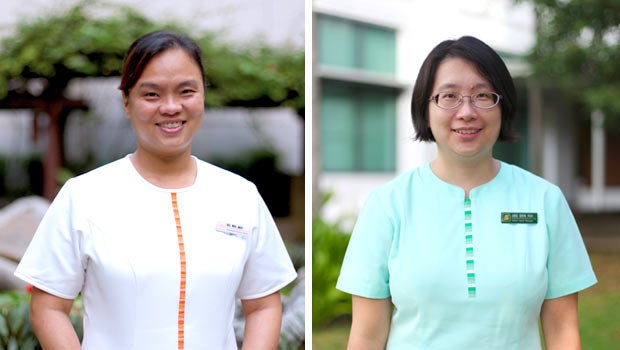
It is generally acknowledged that nurses have the most contact with patients and caregivers within our healthcare institutions. With their unique insights, nurses can ask the right questions to address real needs based on their observations in the wards and clinics.
Ng Wai May, Assistant Director of Nursing at the National Neuroscience Institute (NNI), and Ang Shin Yuh, Senior Nurse Manager at Singapore General Hospital (SGH), are two nurses leading their own research studies as Principal Investigators.
For the sake of patients
After more than 20 years of service in nursing, witnessing two family members suffer from stroke and experience in stroke units and neurology drove Ng Wai May to delve deeper and start her research journey.
Recognised as the "Stroke Nurse" who started stroke specialty units in Tan Tock Seng Hospital and Khoo Teck Puat Hospital, Wai May is now pursuing answers to address post-stroke complications.
It is not easy to juggle clinical and research duties, but Wai May was quick to clarify: "I LOVE it. I would rather open a can of worms than sweep everything under the carpet."
In 2016 Wai May led a quality improvement project on door-to-needle time for patients with acute ischaemic stroke. Patients need to receive a treatment called tPA as soon as possible after an ischaemic stroke, with the first 60 minutes being the most crucial. The team of nurses set out to look at gaps and propose measures to reduce the time taken to administer tPA in NNI.
The results were significant. The new measures brought the median time of administering tPA from 91 minutes in 2014 to 59 minutes in 2016, while the number of patients that receive tPA within the first 60 minutes increased from 16.1% in 2014, to 51.2% in 2016.
The greatest moment after all the hours and effort?
"When we translate it into bedside care and share the information," said Ms Ng. "At the end of the day, we should share our findings with other hospitals and centres so that their patients can benefit from it too."
The moderator and matchmaker
Ang Shin Yuh is an advocate for nursing research. She skilfully juggles research projects, chairing the SingHealth Nursing Research Council, leading nurses on change implementation and constantly scoping new research areas with other nurses.
"It's important that we lead research projects in our own nursing practice specialty. We define the profession for the next generation as we develop our own unique knowledge and expertise," Shin Yuh said.
Shin Yuh's aim is to improve everyday nursing practices. The Nurses' Clinical Handover project is one such project she was involved with.
With her team, a study conducted found that the current clinical handover process between nursing shifts was perceived to be effective but stressful and did not help in preventing delays to delivering care. The findings also revealed that satisfaction levels differed across wards, suggesting ward-specific differences in handover practices.
"These findings give us a chance to find out how to improve the experience nurses go through during a handover between shifts. This will ultimately improve the quality of care our patients receive," said Shin Yuh.
As chairperson of the SingHealth Nursing Research Council, Shin Yuh's job is to encourage the pursuit of research. She shared, "We send out monthly research email bulletins and organise competitions. We have also been running an immersion programme for nurses interested in research. The ideas for studies come from the nurses themselves, because they are the ones encountering real clinical issues in the wards."
Shin Yuh added, "The council is not in it simply for the academic achievements, our focus is very clear: Get tangible results for patients by using evidence-based research."
The SingHealth Nursing Research Day will be taking place on 29 November 2016 at SGH Deck on 9.













 Get it on Google Play
Get it on Google Play